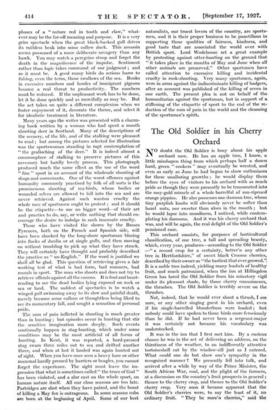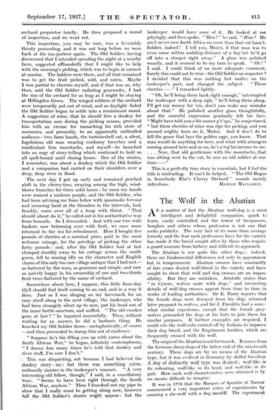The Old Soldier in his Cherry Orchard
NO doubt the Old Soldier is busy about his apple orchard now. He has an apple tree, I know, a little misshapen thing from which perhaps half a dozen hard, green " cookers " may eventually be wrested, and even as early as June he had begun to show enthusiasm for these unalluring growths ; he would display them before the eyes of visitors to his orchard with as much pride as though they were presently to be transmuted into the rosy-gold miracle of a whole barrelful of sun-ripened orange pippins. He also possesses one damson tree, whose tiny purplish knobs will obviously never be softer than hazel nuts, nor sweeter than aloes in the mouth ; but he would lapse into moodiness, I noticed, while contem- plating his damsons. And it was his cherry orchard that was, and will be again, the real delight of the Old Soldier's pensioned ease.
This orchard consists, for purposes of horticultural classification, of one tree, a tall and spreading beauty, which, every year, produces—according to the Old Soldier --" a record crop for a certainty, better'n any other tree in Hertfordshire," of sweet black Croome. cherries, described by their owner as "the tastiest that ever growed.", It is a noble tree indeed, yielding many bushels of healthy fruit, and much patronized, when the inn at Hillingdon Green has lured the Old Soldier from his minatory vigil under its pleasant shade, by those cherry connoisseurs, the thrushes. The Old Soldier is terribly severe on the thrushes.
Not, indeed, that he would ever shoot a thrush, I am sure, or any other singing guest in his orchard, even if his single-barrelled blunderbuss were loaded ; but- nobody could have spoken to those birds more ferociously than he did. If he had never been a sergeant-major it was certainly not because his vocabulary was understocked.
It was in the inn that I first met him. By a curious chance he was in the act of delivering an address, on the thirstiness of the weather, to an indifferently attentive tortoiseshell - cat by the window-sill just as I entered. What could one do but show one's sympathy in the recognized manner ? We presently fell into talk, and arrived after a while by way of the Prime Minister, the South African War, coal, and the plight of the farmers, at a discussion on the country's fruit prospects in general ; thence to the cherry crop, and thence to the Old Soldier's cherry crop. Very soon it became apparent that the Old Soldier's cherries were, to say the least of it, no ordinary fruit. "They be more'n cherries," said the orchard proprietor briefly. He then proposed a round of inspection, and we went out.
This inspection, you may be sure, was a feverishly thirsty proceeding, and it was not long before we were back at the inn-parlour again. The Old Soldier, having • discovered that I intended spending the night at a nearby farm, suggested offhandedly that I might like to help with the morning's picking, which was to begin in earnest at sunrise. The ladders were there, and all that remained was to get the fruit picked, sold, and eaten. Maybe I was partial to cherries myself, and if that was so, why then, said the Old Soldier radiating generosity, I had the run of the orchard for as long as I might be staying at Hillingdon Green. The winged robbers of the orchard were temporarily put out of mind, and as daylight faded the Old Soldier began to settle into a reminiscent mood. A suggestion of mine, that he should hire a donkey for transportation uses during the picking season, provided him with an excuse for ransacking his rich store of memories, and presently, to an apparently enthralled audience—two farm hands, the tortoiseshell cat, a silent, lugubrious old man wearing corduroy breeches and a maidenhair fern moustache, and myself—he launched into an orgy of story-telling which continued to hold us all spell-bound until closing hours. One of the stories, I remember, was about a donkey which the Old Soldier and a companion had carried on their shoulders over a deep, deep river in flood.
The next day I got up early and remained perched aloft in the cherry-tree, swaying among the high, wind- blown branches for three solid hours : by noon my hands were stained a uniform purple, and the Old Soldier, who had been advising me from below with spasmodic fervour and swearing hard at the thrushes in the intervals, had, frankly, come over all of a heap with thirst. "That should about do it," he called out in his authoritative way from beneath. So I descended. And with our two wide baskets now brimming over with fruit, we once more returned to the inn for refreshment. Here I bought five pounds of cherries at a nominal price, paid in the most 'welcome coinage, for the privilege of picking the other forty pounds : •and, after the Old Soldier had at last clumped sturdily away to his cottage across the sunlit green, fell to musing idly on the character and English charm of this only too rare village antique that I had met— so battered by the wars, so generous and simple, and now so naively happy in his ownership of one and two-thirds fruit trees flattered by the name of orchard.
Somewhere about here, I suppose, this little June-day idyll should find itself coming to an end, and in a way it does. Just as I was slinging on my haversack for an easy stroll along to the next village, the innkeeper, who had been strangely silent up to now, put his head out of the inner bottle-sanctum, and sniffed. "The old croaker gorn at last ? " he inquired mournfully. Then, without waiting for an answer, he did a barbaric thing. He knocked my Old Soldier down—metaphorically, of course —and then proceeded to stamp him out of existence.
"Suppose he's bin filling you up with yarns about the Sarth African War," he began, infinitely contemptuous. "I dunno how many times he's told that donkey and river stuff, I'm sure I don't."
This was disquieting, not because I had believed the donkey story—no : but there was something extra- ordinarily sinister in the innkeeper's manner. "A very interesting old fellow, though," I said, in a conciliatory tone. "Seems to have been right through the South African War, anyhow." Then I knocked out my pipe to show that I really must be getting along now, however tall the Old Soldier's stories might appear : but the innkeeper would have none of it.. . He looked at me pityingly, and then spoke. " Him ? " he said. " Him ? He ain't never seen Sarth Africa no more than that cat hasn't. Soldier, indeed ! I tell you, Mister, if that man was to even come within nodding distance of a bay'net he'd. go off into a stooper right away." A glass was polished wearily, and it seemed to be my turn to speak. " Oh ! " I said. I could think of no more adequate comment. Surely this could not be true : the Old Soldier an impostor ? I decided that this was nothing but malice on the innkeeper's part, and changed the subject. "These cherries "I remarked lightly.
"Oh, he'll bring them back right enough," interrupted the innkeeper with a deep sigh, "he'll bring them along. I'll get my money for 'cm, don't you make any mistake about that." He polished another glass thoughtfully, and the scornful expression gradually left his face. "Might have told you a bit sooner p'r'aps," he conjectured, "but them cherries of mine was ripe for picking, and you seemed mighty keen on it, Mister. And it don't do to kill the goose that lays the golden eggs, you know. That man would do anything for beer, and what with strangers coming around here and so on, he's a reg'lar income to me. . . . Now, that old gentleman with the moustache, that was sitting next to the cat, he was an old soldier at one time—" This is a perfectly true story in essentials, but I feel the title is misleading. It can't be helped. "The Old Rogue in Somebody Else's Cherry Orchard" sounds merely















































 Previous page
Previous page